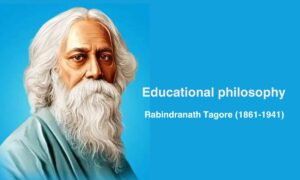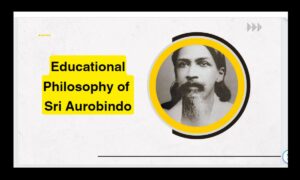The educational philosophy of Mahatma Gandhi is the Free and Compulsory Education, Mother Tongue as a medium of Instruction and craft-centeredness. In this articles, we will cover the Meaning and aims of Education according to Gandhiji and his principle of basic education
Mahatma Gandhi was born in Gujarat on October 2, 1869. Gandhiji was a great leader, a practical philosopher, and an educator of great repute. He wanted to establish a free and casteless society with no exploitation and radical discrimination.
Two pillars of Gandhism are truth and non-violence, for this purpose he used education as an instrument. Mahatma Gandhi’s philosophy of education was the outcome of his long experiences in the political, social, and economic life of the country.
The meaning of education according to Gandhiji is to promote the physical, Mental, and spiritual development of an individual.
Meaning of Education According to Mahatma Gandhi
“Literacy is neither the beginning nor the end of education. This is the only means through which man or women can be educated”
Gandhi believed that education should develop all the capacities of the child so that he becomes a complete human being, it means full development of the body, mind, heart, and soul of the children. Gandhiji has himself explained education as –“ By education, I mean an all-round drawing out of the best in child’s and Man’s body, mind and spirit”
Aims of Gandhian Education
Gandhiji divided educational aims into two categories:-
- Immediate aims of education
- The ultimate aim of education
Immediate Aims of Gandhian Education
- Vocational aim: Gandhiji wished that each child should through his education, be able to learn a productive craft to meet his future needs life by adopting some industry or business. Hence, he advocated education for self-reliance and the capacity to earn one’s livelihood as the main aim of education.
- Cultural aim: Gandhaji wished that education should develop Indian culture. Hence he advocated that together with vocational education, cultural achievement should also be achieved. Two aspects of development should go together side by side. He exhorted-“ I consider the cultural aspects of education as more essential than its academic aspects” Culture is the main foundation and an essential and special part of education. Hence all types of human activities should bear the imprint of culture and refinement.
- Perfect Development Aim: Gandhiji insisted that education should develop all the aspects of individuality, harmoniously. Thus, writing in his famous magazine ‘Harijan’ on 11th September 1937, he writes-“The real education is that which fully develops the body, mind, and soul of children”
- Moral or character development aim: Gandhiji believed that one of the essential aims of education is moral development or character development. About this Gandhiji has written in his autobiography-“I have always given top position to the culture of heart and character development in the process of education. I consider character building as the main and essential basis of educational development”
- Liberation aims: According to Gandhiji is that education Should liberate the body, mind, and soul. By liberation, he meant two kinds of liberation. One was the liberation from all kinds of economic, social, political, and mental slavery. The second was the liberation of the soul world by pursuing and devoting itself to higher forms of spiritual living. Education should provide this spiritual freedom for self-growth and realization of itself.
Ultimate Aims of Gandhian Education
According to Gandhiji, the ultimate aim of education is to realize God. All other aims are subservient to this supreme aim. It is the same aim of self-realization which is coming down since the very early times of Indian wisdom and which constitutes the essence of Indian philosophy
Gandhiji wishes that every child should grow into a divine human being by realizing Godliness in himself. Gandhiji himself wrote-“To develop the self is to build character and to prepare the self for complete realization and realization of Godliness”
Educational Philosophy of Mahatma Gandhi/Principle of Basis Education
- Free and compulsory education: Gandhiji regarding basic education or bunyadi talim, has given his view that education is i.ed elementary education should be free of charge and all should get educated so that they can do the minute calculations of daily living expenses, read and write. This is necessary because this will make a person live independently.
- Mother tongue as a medium of Instruction: Gandhiji emphasized the mother tongue is a medium of instruction: Mother tongue will enable the children to express themselves effectively and clearly. If a student learns in their mother tongue then he can learn easily ethical and moral values and the importance of national heritage. According to him if English is to be taught as the medium of instruction then it hinders the development of understanding and clarity of thoughts and idea
- Craft-centeredness: Learner should get exposure to learn skills and craft like knitting, weaving, agriculture, and cooking which make them self-dependent because they will not only earn on their own but also develops three domains
Physical domain: By doing physical work like agriculture which gives good physical exercise
Psychomotor domain: By developing social skills-how to behave, how to work in a group, and how to coordinate.
Cognitive domain: By developing thinking skills, analyzing, estimating-what would be the expense to prepare craft and how much materials will be required
Gandhiji also suggested that there should not be any inferiority or superiority regarding work, We should do every work/everything with the thinking that those works are mine and they have value whether it is sweeping or work in an office
4. Self-sufficient: Basis education should provide such training that one can realize that immediate aim-earning after or during basic education. Earning for one’s own self and satisfying needs.
5. Co-related teaching: Gandhiji considered knowledge as a whole that each and every subject interrelated while doing craft work, it requires economical skills to buy material and to keep estimating how much it would require. It will also require mathematical skills to calculate the earnings and so on. As the subject should be taught which will lead to all-round development, students should develop a love for the subject to learn them
6. Non-Violence: One of the main aims of basic education is to prepare ideal and responsible citizens who will develop virtues like non-violence so that they are not attracted by violence and other anti-social activities. If each would try to inculcate this value then there will be peace and harmony among the citizens of India. There will not be disagreements and it will be a good understanding with each other.
7. Ideal citizen: Education makes a man think from a broader and ideal perspective therefore Gandhaji focused on preparing ideal citizens of the nation who are responsible and sensible to national duties and rights. Education in civics will give them civic-sense rights and duties to the nation, how government works and it exists.
Gandhiji’s Curriculum
Gandhiji’s scheme of education is known as basic education. Its curriculum is actively centred. Its aim is to prepare the child for practical work, conduct experiments, and do research so that he is able to develop himself physically, mentally, and spiritually and become a useful member of society. In his active-centred curriculum, Gandhiji included mother tongue, Basic craft, Arithmetic, Sociology, General Science, art, music, and other subjects. He further advocated that the curriculum for boys and girls from class-I to Class IV should be the same. After that boys should teach some crafts and girls should study home science.
Gandhiji’s Methods of Teaching
He emphasizes the importance of the following principles in his method of teaching-
- To achieve mental development, training of senses and parts of the body should be given
- Reading should precede the teaching of writing
- Before teaching of the alphabet, art training should be given
- More opportunities should be given for learning by doing
- Encouragement should be given to learning through experiences.
- Correlation should be established in the teaching methods and learning experiences.
Significance of Gandhiji’s education in the present Indian Context
Gandhiji’s principle is to some extent relevant today and its followed not only by India but all over the world. Here is the significance of Gandhi’s education in the present Indian context are-
- Satyagrah: Gandhiji believes in a peaceful place, but the principle of satyagraha still holds good. Example: In Jessica Lal’s Case through a peaceful protest in the form of the candle march almost all over the country justice was delivered
- Women’s Empowerment: Gandhiji’s view about sanitation or decentralization of power or Women’s empowerment every view holds good and follows presently. Women’s empowerment was one of Gandhiji’s main goals. Today Indian women are forerunners is about every field. Today Indian women have an international presence whether it is in space or sports. Example: Indian women earned a Gold Medal in the Olympics.
- Global India: Gandhiji’s dream of creating a global India, a country that encompasses technical and intellectual advancement and maintains its identity is becoming true day by day. Today be it the IT sector, Medicine, Research, and Development. India is upgrading its skills to remain in the Limelight. Indian brains are sought everywhere. Example: Serum Institute is the largest COVID-19 vaccine manufacturer all over the world.
- All round Development: Gandhiji repeatedly emphasized that education should offer an opportunity for self-realization and full development of its personality. In today’s context, the Indian education system is implemented various courses and policies for the all-round development of children. Like Child centred education, Basis education for everyone focuses on learning by doing.
- Self-Reliance: Gandhiji desired that the education system should be self-supporting and that each boy or girl should become self-reliant by learning occupational skills for livelihood. At present Indian content, the Government focuses on skill development. There are various Skill development courses introduced through the ITI Institute. Example: India is leading in startups and entrepreneurs all over the world.
- Free Education: Gandhiji emphasizes free education and the mother tongue at the primary level. In present India Free and Compulsory education for all boys and girls between the age of 7-14 years. The education is imparted at the primary level in the student’s mother tongue.
- Morality: Gandhiji’s emphasis on the improvement of morality within a student. At present Indian, many universities and colleges introduce moral development courses and in every school, there is a provision for moral knowledge to students like non-Violence, truth, and character. Character building through education was the primary concern of Gandhiji. Example: Students are compulsory to take an oath against violence and Substance consumption (Alcohol, smoking). Every school protesting against Tobacco and Cigarette consumption
- Social Service: Gandhiji believes that social service should be an essential part of education. He used to advise students to inculcate the spirit of service and self-sacrifice. Nowadays there are various NGOs present for social service and students can easily take part in them for the betterment of our Nation.
- Citizens Skills: The Wardha scheme did not ignore the ideal of preparing children as good citizens. It was visualized that the children of Free India would need to know the right values of social, Political, and economic life of the country. In present India, almost all data are digitalized students can access it from their homes if found anything wrong they can speak out against it. Freedom of Speech is available in India you can speak against corruption for better citizens and also RTIs is available.
Conclusion:
Mahatma Gandhi, the father of the nation gave the scheme of education for modern India, which can be called the first blueprint of a national system of education, which is job-centered, value-based, and mass-oriented. It is the first model of vocationalisation of education in India.
In Gandhi a scheme of education, knowledge must be related to activity and practical experience. His Scheme of education envisages close integration between the schools and community so s to make children more social-minded and cooperative.


